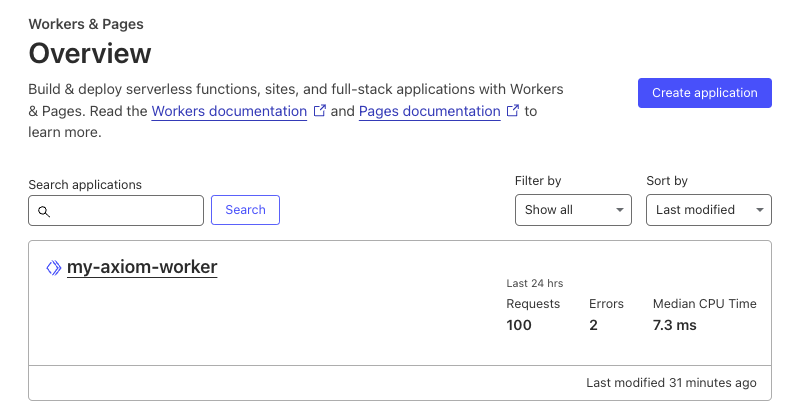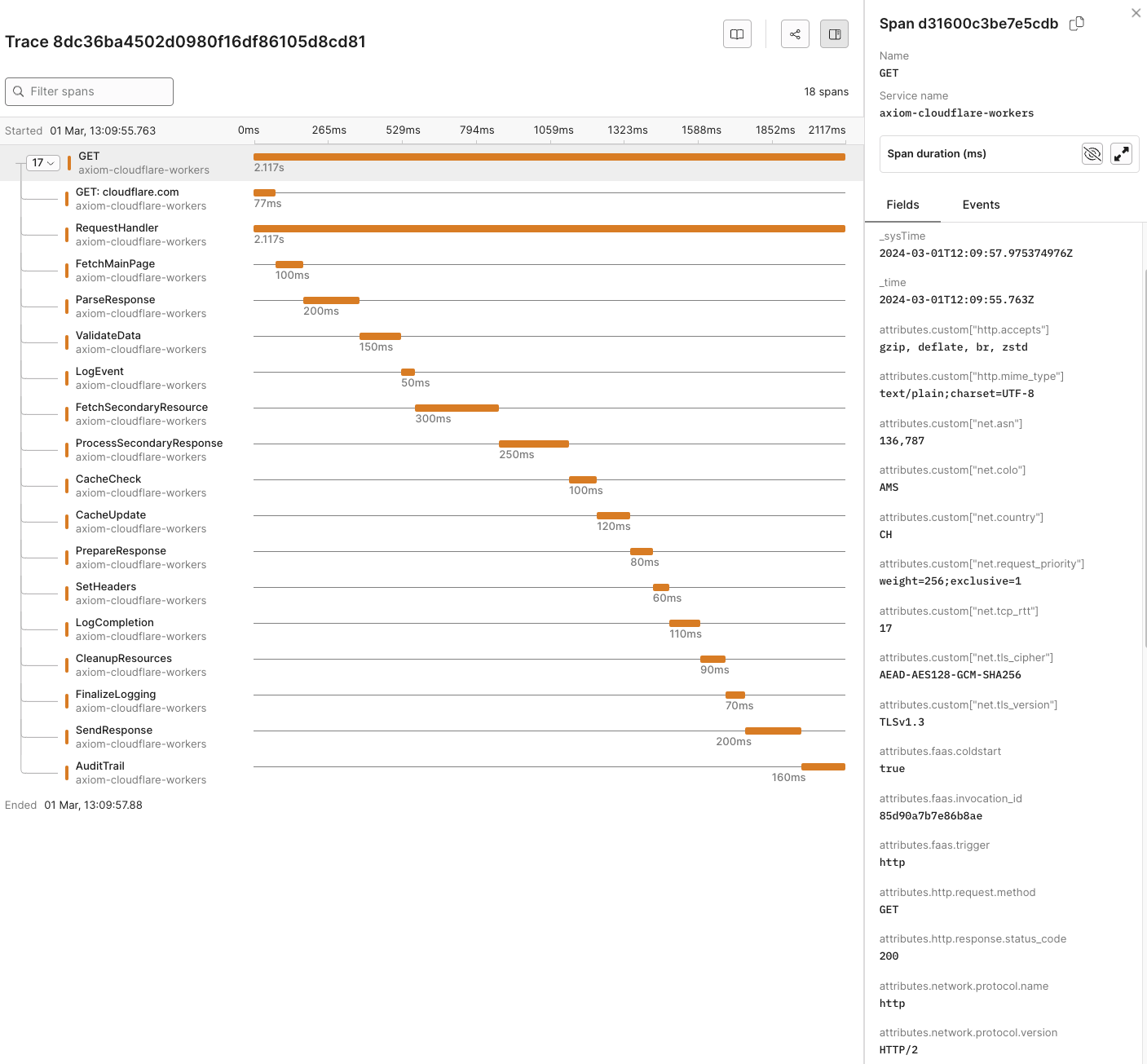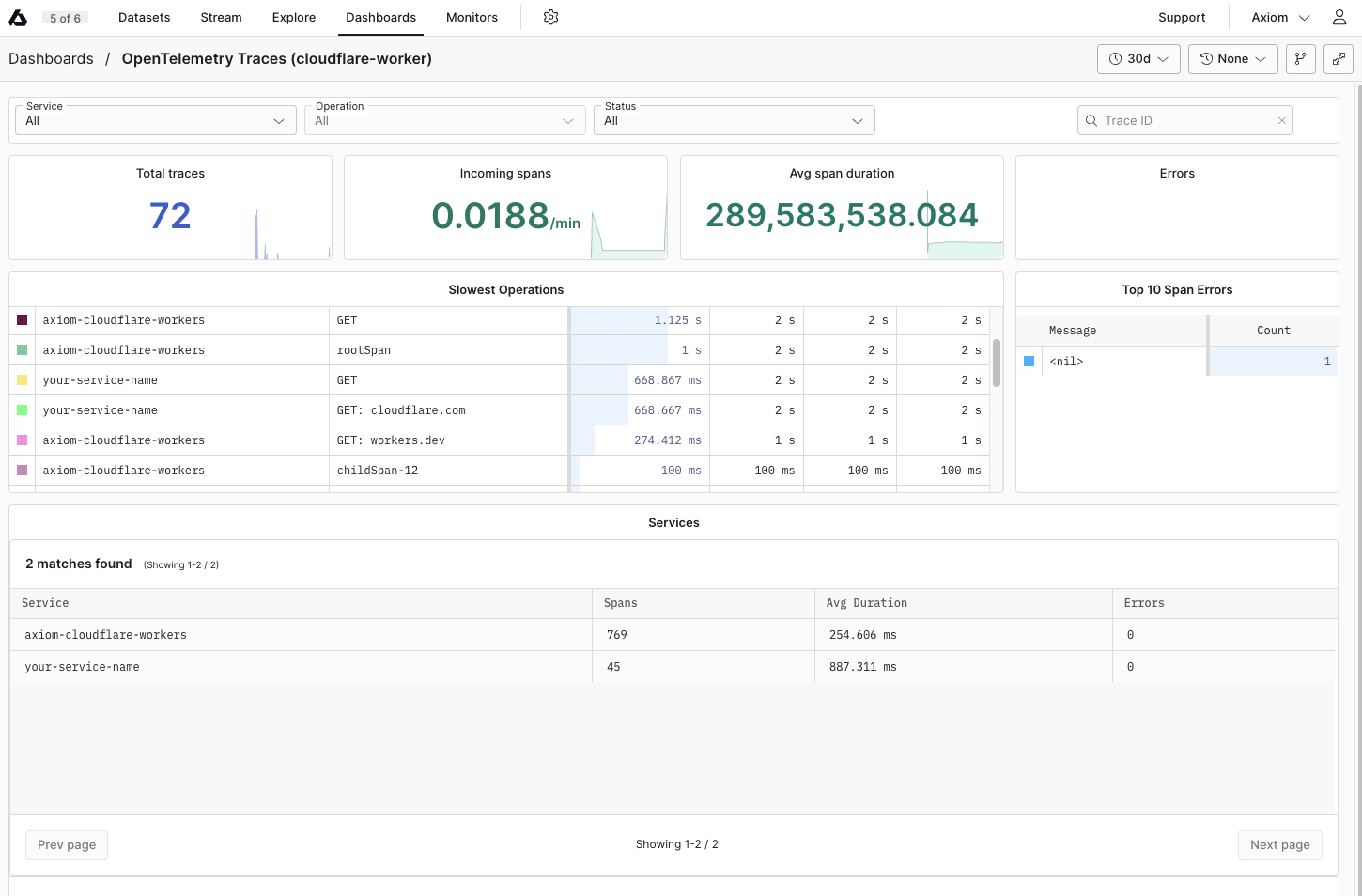Send OpenTelemetry data from a Cloudflare Workers app to Axiom
This guide demonstrates how to configure OpenTelemetry in Cloudflare Workers to send telemetry data to Axiom using the Otel CF Worker package.
Prerequisites
- Create an Axiom account.
- Create a dataset in Axiom where you will send your data.
- Create an API token in Axiom with permissions to query and ingest data.
- Create a Cloudflare account.
- Install Wrangler, the CLI tool for Cloudflare.
Setting up your Cloudflare Workers environment
Create a new directory for your project and navigate into it:
mkdir my-axiom-worker && cd my-axiom-workerInitialize a new Wrangler project using this command:
wrangler init --type="javascript"Cloudflare Workers Script Configuration (index.ts)
Configure and implement your Workers script by integrating OpenTelemetry with the @microlabs/otel-cf-workers package to send telemetry data to Axiom, as illustrated in the example index.ts below:
// index.ts
import { trace } from '@opentelemetry/api';
import { instrument, ResolveConfigFn } from '@microlabs/otel-cf-workers';
export interface Env {
AXIOM_API_TOKEN: string,
AXIOM_DATASET: string
}
const handler = {
async fetch(request: Request, env: Env, ctx: ExecutionContext): Promise<Response> {
await fetch('https://cloudflare.com');
const greeting = "Welcome to Axiom Cloudflare instrumentation";
trace.getActiveSpan()?.setAttribute('greeting', greeting);
ctx.waitUntil(fetch('https://workers.dev'));
return new Response(`${greeting}!`);
},
};
const config: ResolveConfigFn = (env: Env, _trigger) => {
return {
exporter: {
url: 'https://api.axiom.co/v1/traces',
headers: {
'Authorization': `Bearer ${env.AXIOM_API_TOKEN}`,
'X-Axiom-Dataset': `${env.AXIOM_DATASET}`
},
},
service: { name: 'axiom-cloudflare-workers' },
};
};
export default instrument(handler, config);Wrangler Configuration (wrangler.toml)
Configure wrangler.toml with your Cloudflare account details and set environment variables for the Axiom API token and dataset.
name = "my-axiom-worker"
type = "javascript"
account_id = "$YOUR_CLOUDFLARE_ACCOUNT_ID" # Replace with your actual Cloudflare account ID
workers_dev = true
compatibility_date = "2023-03-27"
compatibility_flags = ["nodejs_compat"]
main = "index.ts"
# Define environment variables here
[vars]
AXIOM_API_TOKEN = "$API_TOKEN" # Replace $API_TOKEN with your actual Axiom API token
AXIOM_DATASET = "$DATASET" # Replace $DATASET with your actual Axiom dataset nameInstall Dependencies
Navigate to the root directory of your project and add @microlabs/otel-cf-workers and other Otel packages to the package.json file.
{
"name": "my-axiom-worker",
"version": "1.0.0",
"description": "A template for kick-starting a Cloudflare Workers project",
"main": "index.ts",
"scripts": {
"start": "wrangler dev",
"deploy": "wrangler publish"
},
"dependencies": {
"@microlabs/otel-cf-workers": "^1.0.0-rc.20",
"@opentelemetry/api": "^1.6.0",
"@opentelemetry/core": "^1.17.1",
"@opentelemetry/exporter-trace-otlp-http": "^0.43.0",
"@opentelemetry/otlp-exporter-base": "^0.43.0",
"@opentelemetry/otlp-transformer": "^0.43.0",
"@opentelemetry/resources": "^1.17.1",
"@opentelemetry/sdk-trace-base": "^1.17.1",
"@opentelemetry/semantic-conventions": "^1.17.1",
"deepmerge": "^4.3.1",
"husky": "^8.0.3",
"lint-staged": "^15.0.2",
"ts-checked-fsm": "^1.1.0"
},
"devDependencies": {
"@changesets/cli": "^2.26.2",
"@cloudflare/workers-types": "^4.20231016.0",
"prettier": "^3.0.3",
"rimraf": "^4.4.1",
"typescript": "^5.2.2",
"wrangler": "2.13.0"
},
"private": true
}Run npm install to install the packages. This command will install all the necessary packages listed in your package.json file.
Running the instrumented application
To run your Cloudflare Workers application with OpenTelemetry instrumentation, ensure your API token and dataset are correctly set in your wrangler.toml file. As outlined in our package.json file, you have two primary scripts to manage your application’s lifecycle.
In development mode
For local development and testing, you can start a local development server by running:
npm run startThis command runs wrangler dev allowing you to preview and test your application locally.
Deploying to production
Deploy your application to the Cloudflare Workers environment by running:
npm run deployThis command runs wrangler publish, deploying your project to Cloudflare Workers.
Alternative: Use Wrangler directly
If you prefer not to use npm commands or want more direct control over the deployment process, you can use Wrangler commands directly in your terminal.
For local development:
wrangler devFor deploying to Cloudflare Workers:
wrangler deployView your application in Cloudflare Workers
Once you've deployed your application using Wrangler, view and manage it through the Cloudflare dashboard. To see your Cloudflare Workers application, follow these steps:
-
In your Cloudflare dashboard, click Workers & Pages to access the Workers section. You see a list of your deployed applications.
-
Locate your application by its name. For this tutorial, look for
my-axiom-worker.

-
Click your application's name to view its details. Within the application's page, select the triggers tab to review the triggers associated with your application.
-
Under the routes section of the triggers tab, you will find the URL route assigned to your Worker. This is where your Cloudflare Worker responds to incoming requests. Vist the Cloudflare Workers documentation to learn how to configure routes
Observe the telemetry data in Axiom
As you interact with your application, traces will be collected and exported to Axiom, allowing you to monitor, analyze, and gain insights into your application's performance and behavior.

Dynamic OpenTelemetry traces dashboard
This data can then be further viewed and analyzed in Axiom's dashboard, offering a deeper understanding of your application's performance and behavior.

Working with Cloudflare Pages Functions: Integration with OpenTelemetry is similar to Workers but uses the Cloudflare Dashboard for configuration, bypassing wrangler.toml. This simplifies setup through the Cloudflare dashboard web interface.
Manual Instrumentation
Manual instrumentation requires adding code into your Worker's script to create and manage spans around the code blocks you want to trace.
- Initialize Tracer:
Use the OpenTelemetry API to create a tracer instance at the beginning of your script using the @microlabs/otel-cf-workers package.
import { trace } from '@opentelemetry/api';
const tracer = trace.getTracer('your-service-name');- Create start and end Spans:
Manually start spans before the operations or events you want to trace and ensure you end them afterward to complete the tracing lifecycle.
const span = tracer.startSpan('operationName');
try {
// Your operation code here
} finally {
span.end();
}- Annotate Spans:
Add important metadata to spans to provide additional context. This can include setting attributes or adding events within the span.
span.setAttribute('key', 'value');
span.addEvent('eventName', { 'eventAttribute': 'value' });Automatic Instrumentation
Automatic instrumentation uses the @microlabs/otel-cf-workers package to automatically trace incoming requests and outbound fetch calls without manual span management.
- Instrument your Worker:
Wrap your Cloudflare Workers script with the instrument function from the @microlabs/otel-cf-workers package. This automatically instruments incoming requests and outbound fetch calls.
import { instrument } from '@microlabs/otel-cf-workers';
export default instrument(yourHandler, yourConfig);- Configuration: Provide configuration details, including how to export telemetry data and service metadata to Axiom as part of the
instrumentfunction call.
const config = (env) => ({
exporter: {
url: 'https://api.axiom.co/v1/traces',
headers: {
'Authorization': `Bearer ${env.AXIOM_API_TOKEN}`,
'X-Axiom-Dataset': `${env.AXIOM_DATASET}`
},
},
service: { name: 'axiom-cloudflare-workers' },
});After instrumenting your Worker script, the @microlabs/otel-cf-workers package takes care of tracing automatically.
Reference
List of OpenTelemetry trace fields
| Field Category | Field Name | Description |
|---|---|---|
| Unique Identifiers | ||
| _rowid | Unique identifier for each row in the trace data. | |
| span_id | Unique identifier for the span within the trace. | |
| trace_id | Unique identifier for the entire trace. | |
| Timestamps | ||
| _systime | System timestamp when the trace data was recorded. | |
| _time | Timestamp when the actual event being traced occurred. | |
| HTTP Attributes | ||
| attributes.custom["http.host"] | Host information where the HTTP request was sent. | |
| attributes.custom["http.server_name"] | Server name for the HTTP request. | |
| attributes.http.flavor | HTTP protocol version used. | |
| attributes.http.method | HTTP method used for the request. | |
| attributes.http.route | Route accessed during the HTTP request. | |
| attributes.http.scheme | Protocol scheme (HTTP/HTTPS). | |
| attributes.http.status_code | HTTP response status code. | |
| attributes.http.target | Specific target of the HTTP request. | |
| attributes.http.user_agent | User agent string of the client. | |
| attributes.custom.user_agent.original | Original user agent string, providing client software and OS. | |
| attributes.custom["http.accepts"] | Accepted content types for the HTTP request. | |
| attributes.custom["http.mime_type"] | MIME type of the HTTP response. | |
| attributes.custom.http.wrote_bytes | Number of bytes written in the HTTP response. | |
| attributes.http.request.method | HTTP request method used. | |
| attributes.http.response.status_code | HTTP status code returned in response. | |
| Network Attributes | ||
| attributes.net.host.port | Port number on the host receiving the request. | |
| attributes.net.peer.port | Port number on the peer (client) side. | |
| attributes.custom["net.peer.ip"] | IP address of the peer in the network interaction. | |
| attributes.net.sock.peer.addr | Socket peer address, indicating the IP version used. | |
| attributes.net.sock.peer.port | Socket peer port number. | |
| attributes.custom.net.protocol.version | Protocol version used in the network interaction. | |
| attributes.network.protocol.name | Name of the network protocol used. | |
| attributes.network.protocol.version | Version of the network protocol used. | |
| attributes.server.address | Address of the server handling the request. | |
| attributes.url.full | Full URL accessed in the request. | |
| attributes.url.path | Path component of the URL accessed. | |
| attributes.url.query | Query component of the URL accessed. | |
| attributes.url.scheme | Scheme component of the URL accessed. | |
| Operational Details | ||
| duration | Time taken for the operation. | |
| kind | Type of span (e.g., server, client). | |
| name | Name of the span. | |
| scope | Instrumentation scope. | |
| scope.name | Name of the scope for the operation. | |
| service.name | Name of the service generating the trace. | |
| service.version | Version of the service generating the trace. | |
| Resource Attributes | ||
| resource.environment | Environment where the trace was captured, e.g., production. | |
| resource.cloud.platform | Platform of the cloud provider, e.g., cloudflare.workers. | |
| resource.cloud.provider | Name of the cloud provider, e.g., cloudflare. | |
| resource.cloud.region | Cloud region where the service is located, e.g., earth. | |
| resource.faas.max_memory | Maximum memory allocated for the function as a service (FaaS). | |
| Telemetry SDK Attributes | ||
| telemetry.sdk.language | Language of the telemetry SDK, e.g., js. | |
| telemetry.sdk.name | Name of the telemetry SDK, e.g., @microlabs/otel-workers-sdk. | |
| telemetry.sdk.version | Version of the telemetry SDK. | |
| Custom Attributes | ||
| attributes.custom.greeting | Custom greeting message, e.g., "Welcome to Axiom Cloudflare instrumentation." | |
| attributes.custom["http.accepts"] | Specifies acceptable response formats for HTTP request. | |
| attributes.custom["net.asn"] | Autonomous System Number representing the hosting entity. | |
| attributes.custom["net.colo"] | Colocation center where the request was processed. | |
| attributes.custom["net.country"] | Country where the request was processed. | |
| attributes.custom["net.request_priority"] | Priority of the request processing. | |
| attributes.custom["net.tcp_rtt"] | Round Trip Time of the TCP connection. | |
| attributes.custom["net.tls_cipher"] | TLS cipher suite used for the connection. | |
| attributes.custom["net.tls_version"] | Version of the TLS protocol used for the connection. | |
| attributes.faas.coldstart | Indicates if the function execution was a cold start. | |
| attributes.faas.invocation_id | Unique identifier for the function invocation. | |
| attributes.faas.trigger | Trigger that initiated the function execution. |
List of imported libraries
@microlabs/otel-cf-workers
This package is designed for integrating OpenTelemetry within Cloudflare Workers. It provides automatic instrumentation capabilities, making it easier to collect telemetry data from your Workers applications without extensive manual instrumentation. This package simplifies tracing HTTP requests and other asynchronous operations within Workers.
@opentelemetry/api
The core API for OpenTelemetry in JavaScript, providing the necessary interfaces and utilities for tracing, metrics, and context propagation. In the context of Cloudflare Workers, it allows developers to manually instrument custom spans, manipulate context, and access the active span if needed.
@opentelemetry/exporter-trace-otlp-http
This exporter enables your Cloudflare Workers application to send trace data over HTTP to any backend that supports the OTLP (OpenTelemetry Protocol), such as Axiom. Using OTLP ensures compatibility with a wide range of observability tools and standardizes the data export process.
@opentelemetry/otlp-exporter-base, @opentelemetry/otlp-transformer
These packages provide the foundational elements for OTLP exporters, including the transformation of telemetry data into the OTLP format and base classes for implementing OTLP exporters. They are important for ensuring that the data exported from Cloudflare Workers adheres to the OTLP specification.
@opentelemetry/resources
Defines the Resource, which represents the entity producing telemetry. In Cloudflare Workers, Resources can be used to describe the worker (e.g., service name, version) and are attached to all exported telemetry, aiding in identifying data in backend systems.